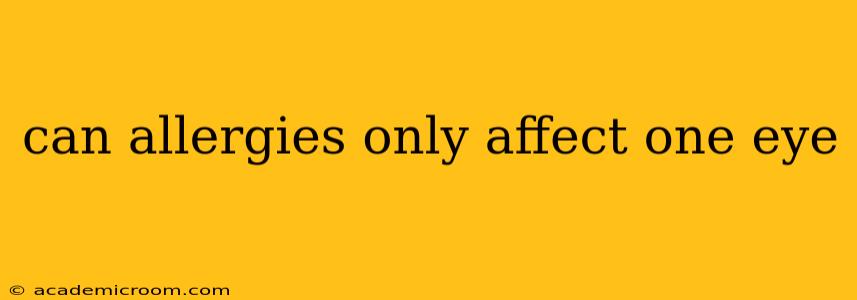Can Allergies Only Affect One Eye? Yes, Unilateral Eye Allergies Are Possible
While allergies often affect both eyes symmetrically, it's entirely possible for allergies to impact only one eye—a condition sometimes referred to as unilateral allergic conjunctivitis. This isn't as uncommon as you might think, and several factors can contribute to this seemingly one-sided affliction. Let's delve into the reasons why you might experience allergic symptoms in just one eye.
Why Would I Only Have Allergies in One Eye?
This question often arises because allergies are typically thought of as a systemic reaction, affecting the body symmetrically. However, the reality is more nuanced. Several factors can explain why allergies might manifest unilaterally:
-
Asymmetrical Exposure: The most common reason is simple exposure. Imagine you're working in your garden, and a gust of wind blows pollen directly into one eye. This localized exposure could trigger an allergic reaction in that single eye, while the other remains unaffected. Similarly, rubbing one eye more than the other after contact with an allergen could increase the chance of inflammation in just that eye.
-
Underlying Eye Condition: A pre-existing eye condition, like dry eye or blepharitis (inflammation of the eyelids), in one eye can make it more susceptible to allergic reactions. The irritated eye might be more prone to inflammation and symptom development compared to the healthy eye.
-
Individual Variation in Immune Response: Just like other aspects of our immune systems, the way our bodies respond to allergens can be highly individual and asymmetrical. One eye might simply have a heightened sensitivity to a specific allergen compared to the other.
-
Mechanical Factors: Something as simple as a contact lens in only one eye could increase the risk of an allergic reaction in that specific eye due to prolonged contact with allergens trapped under the lens.
What Are the Symptoms of Unilateral Allergic Conjunctivitis?
The symptoms of unilateral allergic conjunctivitis are similar to those of a typical allergic reaction, but they are limited to one eye:
- Itching: Intense itching is a hallmark symptom.
- Redness: The eye will appear red and bloodshot.
- Watering (tearing): Excessive tearing is another common sign.
- Swelling: The eyelids or conjunctiva (the membrane lining the eyelid and covering the white of the eye) might swell.
- Discharge: A clear or white discharge may be present.
How Is Unilateral Allergic Conjunctivitis Diagnosed and Treated?
Diagnosis typically involves a thorough eye examination by an ophthalmologist or optometrist. They'll ask about your symptoms, medical history, and potential allergen exposures. Treatment often involves:
- Over-the-counter antihistamines: Eye drops containing antihistamines can help alleviate itching and redness.
- Mast cell stabilizers: These eye drops can help prevent the release of histamine, reducing allergic symptoms.
- Corticosteroids: In more severe cases, your doctor might prescribe corticosteroid eye drops to reduce inflammation. However, long-term use of corticosteroids should be avoided due to potential side effects.
Can Allergies in One Eye Spread to the Other?
While it’s possible for an initial exposure to affect one eye and later spread, it's often not the case. If your allergy is caused by environmental factors (like pollen), prolonged exposure could eventually affect both eyes. However, if the underlying cause is contained (like a single contact lens reaction), it's less likely to spread.
When Should I See a Doctor About One-Sided Eye Allergies?
It's crucial to consult an ophthalmologist or optometrist if:
- Symptoms are severe or persistent.
- You experience blurred vision or significant eye pain.
- Home remedies don't provide relief.
This information is for general knowledge and does not constitute medical advice. Always consult with a healthcare professional for diagnosis and treatment of any eye condition.
